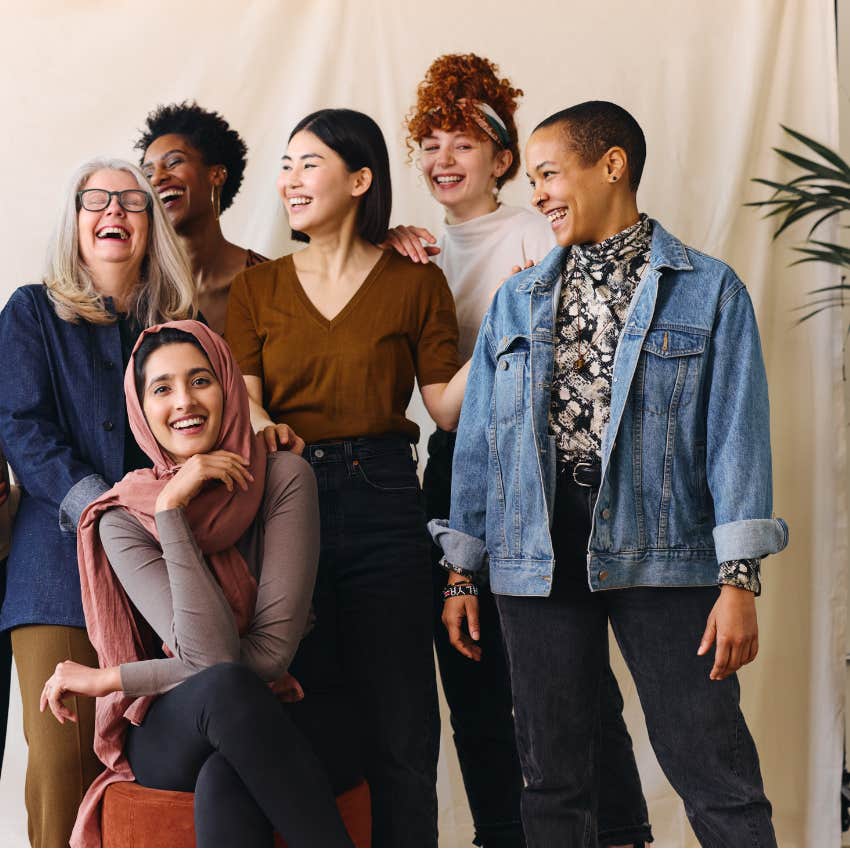Middle-Aged White Woman Responds To Claims That Women Her Age Are ‘The Problem With Everything’
"I just wanna say, I didn't really know I was in charge."
 Gladskikh Tatiana / Shutterstock
Gladskikh Tatiana / Shutterstock Comedian Karen Rontowski recently shared a message of unity, calling out the ever-conflicting perspectives that seem to make it so easy to pit people against each other.
The middle-aged white woman responded to claims that women her age are ‘the problem with everything.’
“Hey everyone, middle-aged white woman Karen Rontowski here to apologize: I just recently found out women my age are the problem with everything,” she said, launching into a comedic approach to younger people’s skewering of women of a certain age.
“Much in my defense, I just wanna say, I didn’t really know I was in charge,” she continued.
“I was just trying not to overfill the washing machine so it didn’t smoke and make the whole apartment building smell bad,” Rontowski exclaimed, making light of both the imbalance of power between men and women and the expectation that a woman stays within her domain of cleaning, cooking, and not using her brain.
“Well, we may not have been perfect, but let me give you a few facts, moon farts, that you may not have known,” Rontowski said before outlining various ways women have been held down, both within the confines of the legal system and society at large.
“Up until the 1960s, there was this thing called ‘involuntary commitment,’ where if a man wanted a divorce but didn’t wanna give his wife some of his money, he could drop her off at an insane asylum and have her committed, no questions asked,” she said.
“And here’s another thing,” she said. “When I was in high school, and we were raped, the first question we were asked was, ‘What were you wearing?’ Because really, it was our fault,” she said. “We were then shushed and [told], ‘That’s a nice boy and he’s going to college, don’t ruin things for him.’”
Unfortunately, it’s important to note that this victim-blaming behavior is just as prevalent in 2024 as it was decades earlier — Don’t forget all the Brock Turners of the world.
“We may not have been perfect, but we were busy,” Rontowski said. “So, before you criticize us, I just wanna say, ‘You’re welcome.’”
“We did a lot of things. We were handed Barry Manilow and the Piña Colada song, and we left you with Nirvana,” she said, using humor to highlight social change. “We were forced to wear underwire bras, and now you get to wear wire all over your face. That’s because of us.”
Certain restrictions are looser now than they were in the past, yet women still exist within rigidly defined expectations of what to wear, how to act, and who to be.
“Now I’m gonna borrow a phrase from your generation that you wouldn’t be allowed to say if it wasn’t for women like me, who are at gay pride parades or fighting for the sexual rights of everyone,” Rontowski said, a line that landed more on the side of overlooking what people in marginalized communities have done for themselves, without needing a white woman’s help to advocate for themselves.
“To the handful of men who didn’t get to have sex with their mother and wanna blame women like me for their problems, today, I identify as a man, so you can suck my [expletive],” Rontowski exclaimed, veering slightly off-course into the territory of, maybe we shouldn’t poke fun at trans identities, especially when trans people are continually under legislative and literal physical attack.
“Now, back to you, young ladies,” she said. “The game is now yours. Women my age are done.”
 Photo: Southworks / Shutterstock
Photo: Southworks / Shutterstock
“You can spend your time arguing with women like me, or you can say, ‘Hey, old white ladies— Can you help us out? We got a little problem over here with racism. We got a little problem over here with body rights. Can you help us out?’ And you know what we’re gonna say? 'Yes,'” Rontowski exclaimed, as though 52% of white women weren’t a major part of the votes that got Trump into office so he could pack the Supreme Court with other white women like Amy Coney Barrett, who stripped us all of our bodily autonomy and the right to free, safe abortions.
“What the patriarchy doesn’t want you to know is we’re rooting for you,” she said. “We want you to win. We want you to go places that we couldn’t.”
There’s no denying that previous generations have fought battles that current generations often take for granted. Women in their 50s, 60s, and 70s broke the glass ceiling with their faces, yet what’s important is how they acted afterward.
Did they leave the doors open for others to enter? Or did they slam shut their access points, leaving others out in the cold?
“Now, I want you to think about that. Your energy on the front and a bunch of old white [expletive] like me in the back: That’s the army you go to war with. That’s how you change the world,” she exclaimed. “So, maybe don’t criticize us, but you bring us along because it’s like the good man says: White women aren’t afraid of [expletive].”
Rontowski’s comedic message is ultimately a call to action. Essentially, she’s saying, 'Women my age did all these awesome things. Now it’s your turn to take it further.'
She isn’t wrong, but she’s not entirely right, either. Her argument overlooks intersectionality in a major way, whitewashing struggles for liberation where women of color were front and center, leading the charge.
Again, it’s hard to ignore the 52% of white women who voted Trump into office in 2016, choosing to protect white supremacy and patriarchy over any form of sisterhood.
One woman’s comment underneath Rotonowski’s post summed it up concisely, saying, “If you’re not a middle-aged white woman, voting Republican against the interest of women, you’re probably not who’s being talked about.”
In 2020, 90% of Black women and 69% of Hispanic women voted for Biden, giving him the edge he needed to defeat Trump.
In contrast, at 40%, white women make up the largest single bloc of the electorate, and the majority of those voters’ loyalties lie with Trump.
Rontowski is making the valid argument that changes only occur when we recognize our strength in numbers, when we get each other’s backs, and when we lift each other up as we continue to climb.
Alexandra Blogier is a writer on YourTango's news and entertainment team. She covers social issues, pop culture analysis, and all things to do with the entertainment industry.

